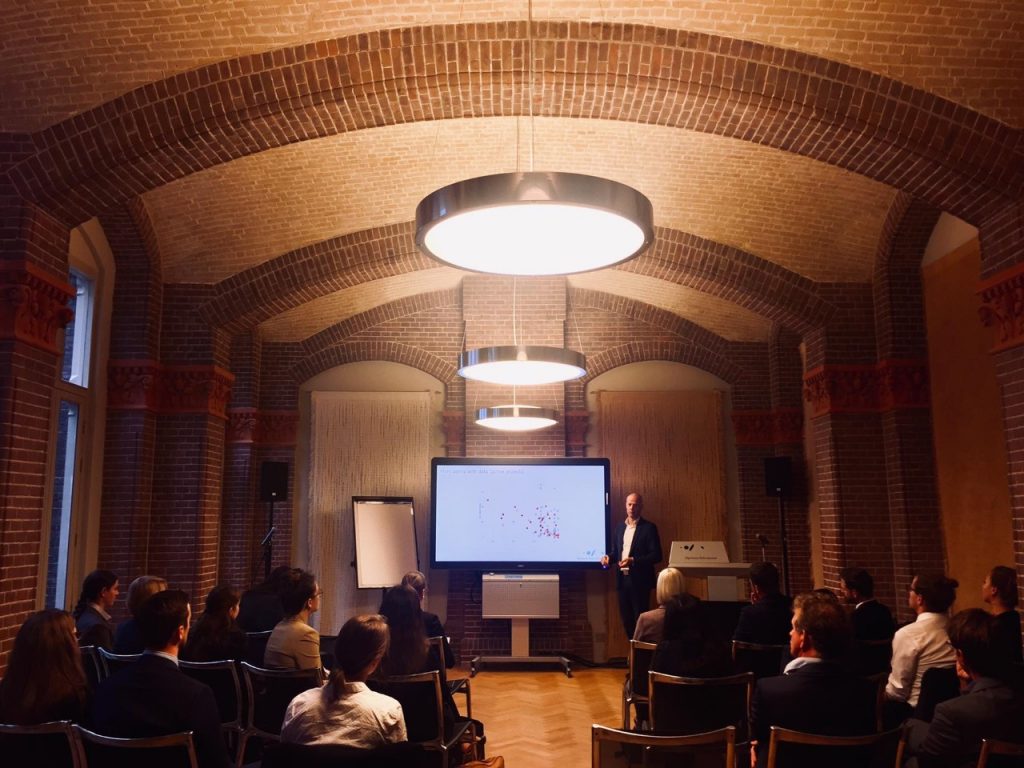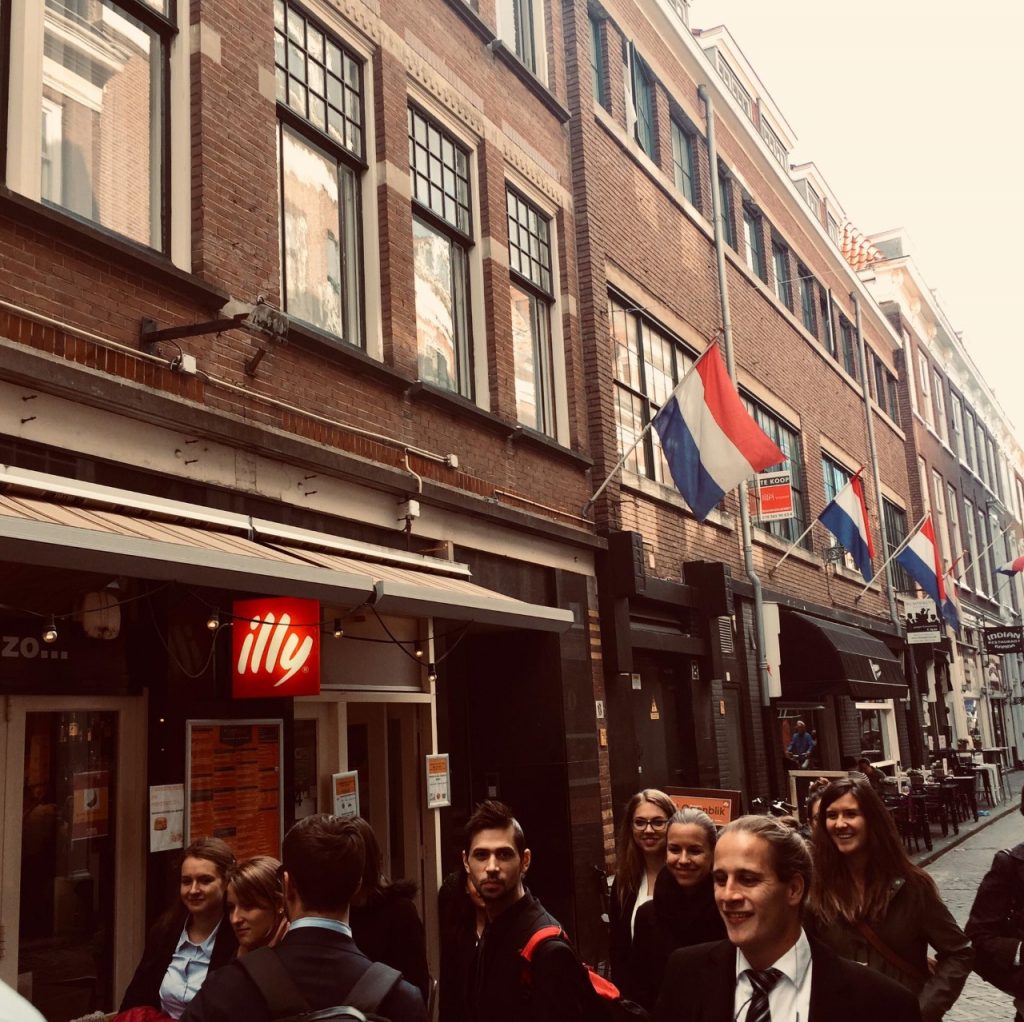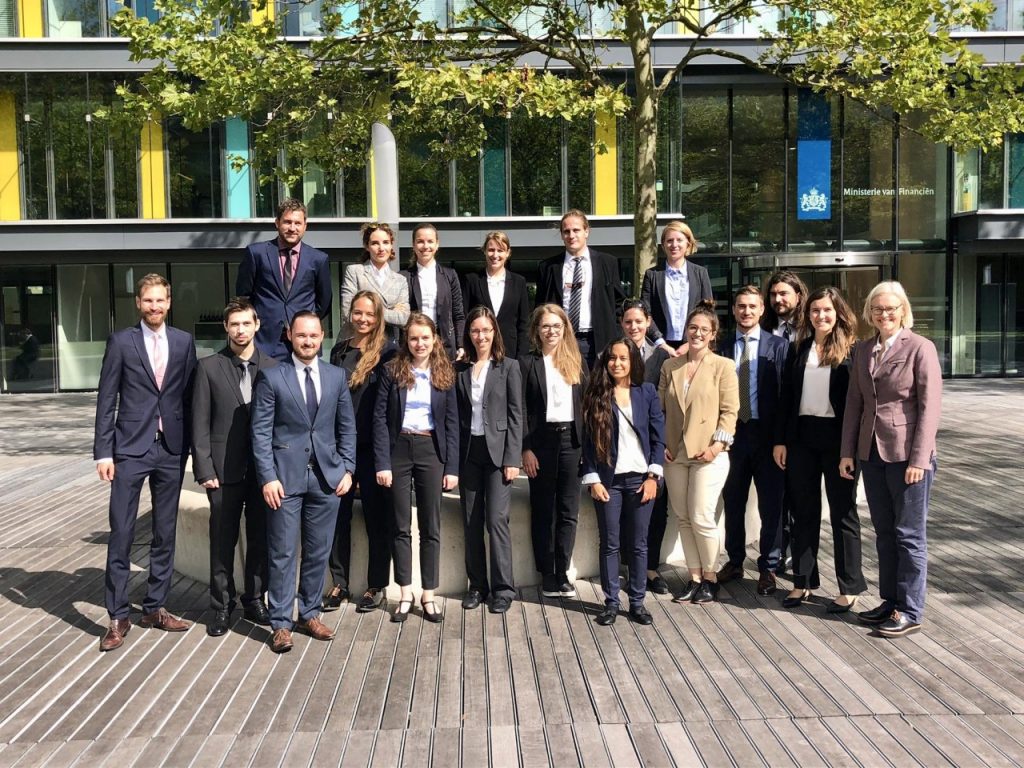Den Haag is a city near the Western Sea Side, the seat of Netherlandish Government, Binnenhof (the Parliament) and the International Court of Justice, home to half a million citizens and the King himself.
This morning we had to get up quite early. Nevertheless our group was looking forward to today’s program: Den Haag is calling! As there have been some spontaneous changes in the agenda, we had to improvise a little during the briefing. Before getting into the train everyone had time to catch a hot awakening coffee. While traveling to Den Haag we could enjoy the beautiful landscape.
Welcome to the Netherlandish Court of Audit (Welkom bij de Algemene Rekenkamer)! We were instructed about the autonomous government organ (Hoog College van Staat), whose task is to audit how the Netherland’s ministries spend the revenues. These are provided by the Netherlandish tax payers. Our hosts, Maaike Damen, Jost van Hofwegen (Research and Audit Director), Martin Dees, Gijs Koop (Senior Researcher), Rudi Turksema, Maarten de Jong started with a couple of key facts about the Court of Audit. They underlined that it is important that public spending is more than just finances, it also impacts the environment. The Netherlands recognized that impact very early and implemented the Court of Audits in their constitution in 1814 as a counterweight to the government. The Netherlandish law secures that; Cooperation is mandatory for all governmental bodies as the likes of ministries. They have to provide the Court of Audits with all the financial information they ask for. Other bodies are audited as well, Quasi Non-Governmental Organisations (QUANGOS) for example. Digitalization, which were also discussed on Monday and Tuesday (of our Study Trip), also takes place in the Algemene Rekenkamer. Accounting and audit are more and more shifted into a digital form. However, there’s a lack of qualified personnel in the field of IT and programming such systems in the Netherlands. Therefore the few people available in this branch were invited to an accountability-hack (a kind of competition who can program the best accounting-system). The Court of Audit’s internal personnel was trained in IT as well. Structuration and automation were the goals of these actions. On the other hand, the more data is collected, the more difficult it is, to handle. Therefore, complexity, data ethics and security are the downside/challanges of this digitalization-trend. Untypical for an innovative country like the Netherlands is, that on central government level, still the simplified version of cash accounting is in use (in which expenses and revenues are taken into account when they are paid, not when they occur). While the OECD encourages accrual accounting, the European Union (EU) makes no progresses in invoking the much rumored EPSAS (European Public Sector Accounting Standards), which would have that and other detailed accounting regulations in write. The EU was a target of justified critics this morning, as its suboptimal revenue-collection and redistribution was addressed as well. Finally, the New Public Management approach of output-oriented budgeting was discussed in a critical manner as well.


We enjoyed having our delicious lunch in the historical center of Den Haag.
Welkom bij het ministerie van Financiën (Welcome to the Ministry of Finance)!
First we got background information from Bart about the tax and customs administrations and the organization of the tax collection. He pointed out also several deficiencies. The most important ones were legacy, management-information and strategic personal planning. He then presented Moore’s strategic triangle and encouraged the students to map the challenges of the Tax and Customs Administration by refering to that framework to cut through the complexity of the organization.
Bert Kloster, International Affairs, talked to us about the international strategy and cooperation against tax avoidance. He pointed out that internationalization and globalization cleared the path for multinational companies to avoid taxes.
In the meantime new sources of information like social media and Internet in general changed the people’s expectations about the government’s institutions. More precisely, transparency has become more and more important to ensure the high compliance of civil taxpayers in the Netherlands and the G20 countries. The OECD BEPS (Base Erosion and Profit Shifting) replaced the system of earlier, mostly bilateral, tax treaties. These bilateral treaties had been used as a playground. Some multinational companies even shaped their business structures in a way that no or very little tax had to be paid. According to Bert, not only the developed countries suffered from tax avoidance. Also, developing countries like Ghana and Malawi did not receive the amount of taxes they should have. These countries did not have the resources (HR or financial) to deal with the taxing duties of multinational companies. BEPS made it possible not only for the G20 to take in the guidance of OECD into their national legislation, it also provided practical help and technical assistance for developing countries, which originally felt the negative consequences of BEPS.
